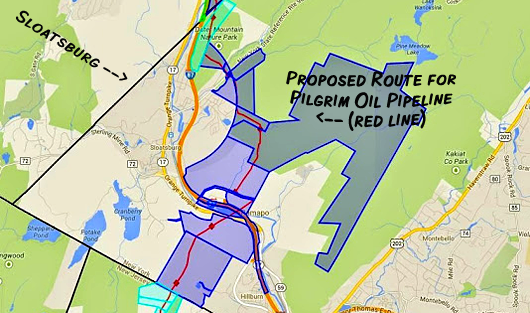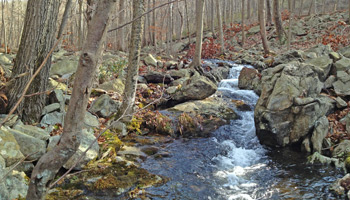 Many people have heard faint rumors of the Bakken oil boom in western North Dakota, with Williston, ND officially dubbed as Boomtown, USA.
Many people have heard faint rumors of the Bakken oil boom in western North Dakota, with Williston, ND officially dubbed as Boomtown, USA.
The Bakken rock formation is being hydraulically fracked for oil that the U.S. Geological Survey expects could ultimately produce some seven billion barrels. Millions of gallons per week of unrefined, highly volatile petroleum products are shipped by rail and barge via Hudson River waterway to Albany. One estimate suggested that currently 25 million gallons per week of Bakken oil products are shipped by barge alone from Albany to the Linden, NJ, refinery.
 Now the Pilgrim Pipe Co. has proposed to fast track a new 178 mile double 16″ and 18″ pipeline that would connect Linden’s refinery to Albany, New York and transport anything from gasoline to diesel to heating oil and aviation fuel. The 18” pipeline would carry crude oil originating from the Bakken region.
Now the Pilgrim Pipe Co. has proposed to fast track a new 178 mile double 16″ and 18″ pipeline that would connect Linden’s refinery to Albany, New York and transport anything from gasoline to diesel to heating oil and aviation fuel. The 18” pipeline would carry crude oil originating from the Bakken region.
The proposed Pilgrim pipeline route in Rockland County would run from north to south through Dater Mountain County Park in the Town of Ramapo, cut through the northeastern edge of Sloatsburg, cross Seven Lakes Drive and parklands adjacent to the Pine Grove Lakes neighborhood, running through hills just north of Pine Grove Lake itself, skim the western edge of Torne Mountain along Beaver Brook in Harriman State Park, where it turns sharply east over the lower terrace of Torne Mountain, then jogs south under the Ramapo River.
Thereafter, the proposed pipeline route would follow a utility corridor into New Jersey.
Pilgrim Pipeline Holdings, LLC, part of the Pilgrim Pipe Co., estimates the cost of the pipeline construction to be one billion dollars with an online service date set for 2017.
The pipeline would cross the Ramapo River in close proximity of United Water well heads and directly through the Ramapo Valley Aquifer which supplies millions of gallons of water daily to residents of Rockland County.
With estimates of some 14 oil trains moving through Rockland County on CSX tracks, crude oil traffic through Rockland has become a growing concern to local legislators, who are requesting more transparency in the transportation process. In March, Rockland Sheriff Louis Falco said his department would request daily CSX cargo logs to notify local police and fire departments when volatile crude products are passing through.
“Guess who pays for the catastrophes and clean-ups?” asked Rockland County Legislator Harriet Cornell, D-West Nyack in a March LoHud article, who said that ultimately the cost of a spill clean up would fall to taxpayers.
Pilgrim is seeking permission from the Rockland County Division of Environmental Resources to begin a survey along the proposed pipeline route before the company presents a formal construction application to the Federal Energy Regulatory Commission (FERC). The company is seeking temporary access along the route to conduct an environmental and archeological survey that it will submit to New York as part of the overall permit application.
Pilgrim will need to obtain permission from property owners to access land along the proposed corridor, which will include the Palisades Interstate Park Commission, the County of Rockland, the Town of Ramapo, and the Village of Hillburn. The New Jersey Sierra Club has urged property owners along the proposed Pilgrim New Jersey corridor to deny survey permission, citing that the pipeline presents a risk to public water supplies, the Highlands and other sensitive areas. The New Jersey Highlands supplies drinking water to half the state’s population, according to Kate Millsaps, environmental coordinator and program assistant with the New Jersey Sierra Club.
“Bakken crude oil is flammable, toxic and corrosive,” wrote Millsaps in an April Op-Ed in the Star-Ledger. The light oil contains few solids which in turn can make it highly explosive.
“We would see wetlands destroyed, critical habitats for threatened and endangered species leveled to the ground, and impacts on waterways from construction erosion,” Millsaps wrote.
As part of its communication with the county, Pilgrim has indicated that the construction of the proposed pipeline will provide a “safer and more reliable way of transporting refined petroleum products to and from the Albany area while also enhancing energy security.




